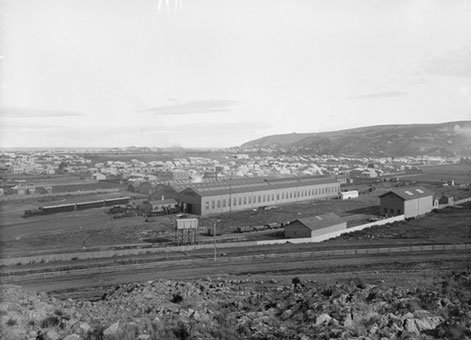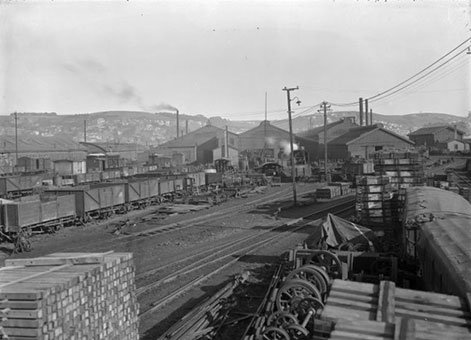Dunedin's Hillside Railway Workshops have played a major role in the construction of locomotives and freight wagons for New Zealand’s railway system.

Hillside Railway Workshops, Dunedin, looking towards St Clair. Williams, Edgar Richard, 1891-1983. Ref: 1/1-025911-G. Alexander Turnbull Library, Wellington, New Zealand. /records/23177475
The five government workshops at Addington, Hillside, Otahuhu, Wanganui and Woburn, were early industrial complexes. Hillside initially opened in the mid-1870s as a relatively small repair workshop, but soon was significantly expanded. Further major upgrading and expansion occurred from 1926 to 1929.
Between 1897 and 1967 Hillside manufactured a total of 190 locomotives, including 90 4-6-4 tank engines (Classes Wg, Ww and Wab) between 1910 and 1927, and 35 4-8-2 Ja express engines between 1946 and 1956. During World War Two Hillside manufactured three-inch mortars, as well as machined components for other weapons systems.
Hillside was the largest industrial complex in the southern half of the South Island, employing a maximum of nearly 1,200 people in 1946.
Between 1966 and 1990 Hillside produced nearly 1,600 wagons, including 1,200 bogie container wagons between 1971 and 1988. Late 20th century contracts included large car carrier wagons and hopper wagons for fertiliser, utilising both steel and aluminium alloys.

Workshop yards at the Hillside Railway Workshops in Dunedin, 1925.. Godber, Albert Percy, 1875-1949. Ref: APG-1627-1/2-G. Alexander Turnbull Library, Wellington, New Zealand. /records/23035107
In 1989 the workshops were renamed Transtec Hillside Engineering, a division of Transport Engineering Equipment Liaison (TEEL) Business Group of the New Zealand Railways Corporation.
At this time Hillside was the largest mechanical engineering enterprise in New Zealand, and incorporated the largest metal foundry. It concentrated on iron and steel castings, steel and aluminium machining and fabrication, wagon assembly, together with the physical testing of metals and castings.
In 2012 the Hillside Railway Workshops were still operating, although on a smaller scale and with an uncertain future. Later that year KiwiRail sold the foundry to Australian company Bradken and most of the existing staff were made redundant.
Between 2020 and 2024 KiwiRail is carrying out a project to redevelop the workshops, including a new mechanical workshop, new wagon assembly facility and new offices and workshops.
Heritage recognition
IPENZ “Engineering to 1990” project
This item of New Zealand’s engineering heritage was recognised as part of the IPENZ “Engineering to 1990” project, which the Institution organised to help celebrate the country’s sesquicentenary in 1990. A plaque was unveiled to mark the significance of these railway workshops as part of the development of the nation.
New Zealand Archaeological Association
The site is in the New Zealand Archaeological Association Site Record as site I44/1052. See ARCHSITE
More information
Access
The buildings are visible from the street, but the workshops are not open for public viewing.
References
Ian Dougherty, More than just a place of work: a history of Dunedin's Hillside Railway Workshops (Wellington: New Zealand Railway and Locomotive Society, 2015).
Matthew Wright, New Zealand Engineering Heritage, 1870–2000 (Auckland: Reed, 1999), pp.33-34.
'Hillside closure a tragedy for Dunedin and workers,' Scoop Independent News, 20 December 2012, accessed 26 August 2015.
"Hillside workshops redevelopment," KiwiRail, accessed 28 March 2023.
Location
Hillside Road, South Dunedin, Otago.

